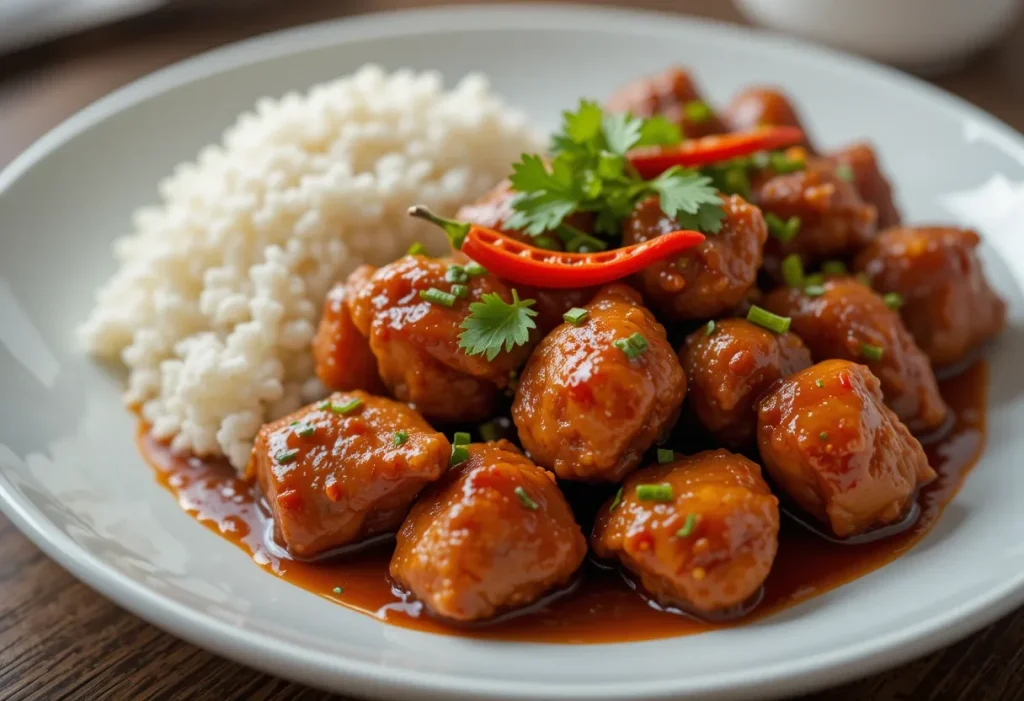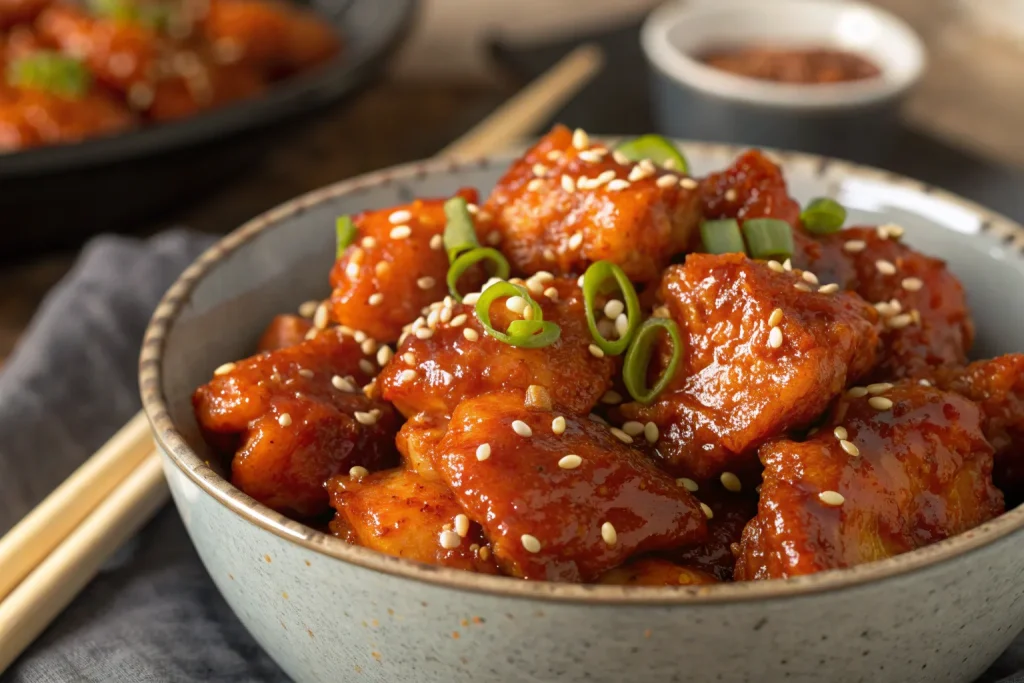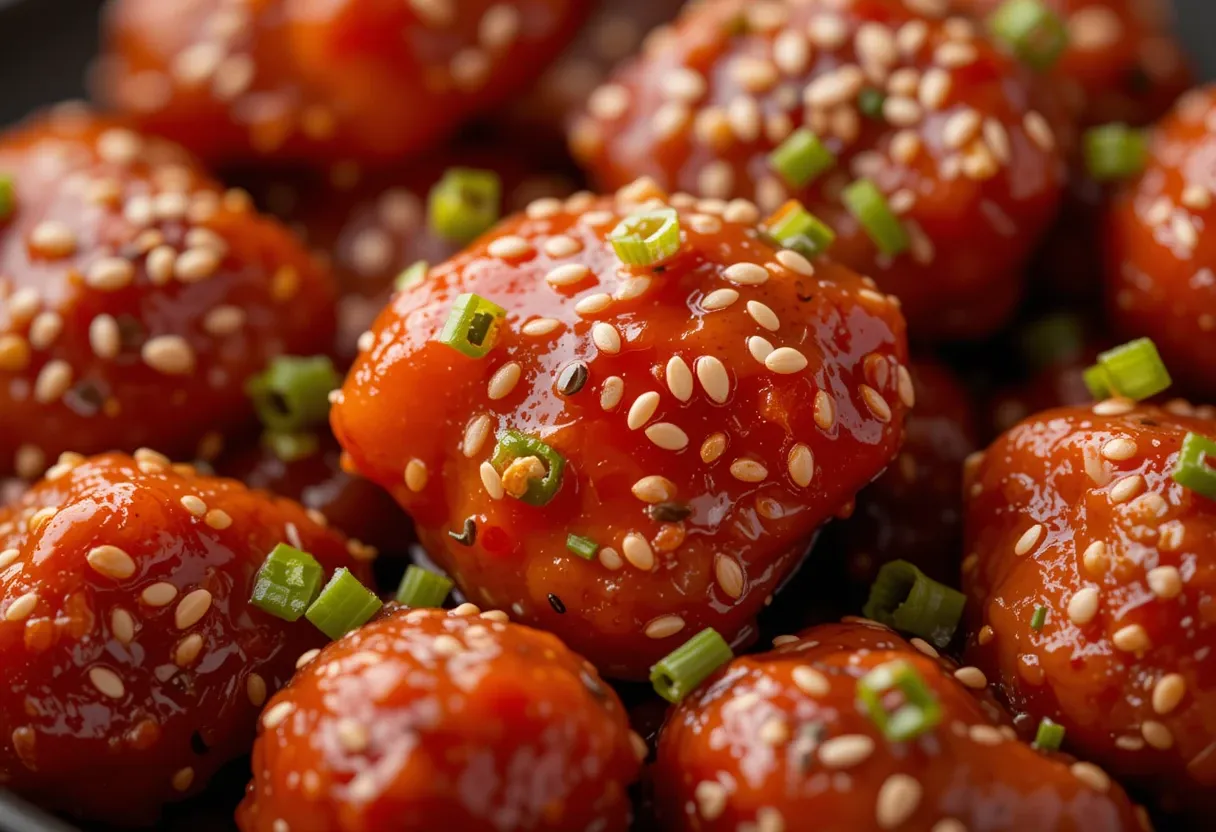Korean Spicy Chicken: A Bold and Flavor-Packed Favorite

If you’re craving a dish that’s packed with heat, flavor, and a little bit of sweet tang, Korean spicy chicken is the ultimate comfort food to try. This fiery and crispy chicken dish delivers an addictive blend of spicy gochujang (Korean chili paste), garlic, and a touch of sweetness that makes every bite unforgettable. Whether you’re ordering takeout or cooking at home, Korean spicy chicken brings bold Korean flavors straight to your plate.
Why This Dish Stands Out
Korean spicy chicken isn’t just about heat—it’s about the perfect balance of spicy, sweet, and savory that keeps you coming back for more. The crispy chicken pieces coated in a sticky, flavorful sauce are both satisfying and exciting to the palate. Whether you’re sharing it with friends during game night or enjoying a cozy dinner, this dish never fails to impress with its dynamic flavors and comforting crunch.
Simple Ingredients, Big Impact
You don’t need a pantry full of exotic ingredients to make delicious Korean spicy chicken at home. With a few key staples like gochujang, soy sauce, garlic, and some basic chicken cuts, you can whip up a restaurant-quality dish that tastes authentic and rich. It’s versatile too—use boneless chicken thighs for extra juiciness or wings if you want finger-licking fun.
- 1 lb boneless chicken thighs or wings, cut into bite-sized pieces
- 2 tbsp gochujang (Korean chili paste)
- 2 tbsp soy sauce
- 1 tbsp honey or brown sugar
- 3 cloves garlic, minced
- 1 tbsp rice vinegar
- 1 tsp sesame oil
- 1 tbsp vegetable oil (for frying)
- Sesame seeds and sliced green onions for garnish
How to Make It

Making Korean spicy chicken at home is easier than you might think, and the results are well worth the effort. From crispy frying to simmering in a vibrant sauce, here’s how to bring this Korean favorite to life:
- Prepare the Chicken
Pat the chicken dry and season lightly with salt and pepper. For extra crunch, you can dust the chicken pieces with cornstarch before frying. - Fry or Pan-Sear the Chicken
Heat vegetable oil in a pan over medium-high heat. Fry the chicken pieces until golden brown and crispy, about 6–8 minutes. Remove and drain excess oil. - Make the Spicy Sauce
In a separate bowl, whisk together gochujang, soy sauce, honey, minced garlic, rice vinegar, and sesame oil until smooth. - Combine and Coat
Return the fried chicken to the pan, pour the sauce over, and toss well to coat every piece evenly. Cook for 2–3 minutes until the sauce thickens and clings to the chicken. - Garnish and Serve
Sprinkle with toasted sesame seeds and sliced green onions before serving. Enjoy with steamed rice or crunchy pickled radishes.
Healthier Alternatives
Looking to enjoy this spicy delight with a lighter twist? There are plenty of ways to reduce calories or make the dish more balanced while keeping the authentic flavors intact:
- Bake or Air Fry the Chicken
Skip deep frying by baking or air frying the chicken pieces for a crispier, less oily option. - Use Skinless Chicken Breast
Swap thighs for skinless chicken breast if you prefer leaner meat. - Reduce Sugar
Cut back on honey or brown sugar, or use natural sweeteners like maple syrup or agave. - Add Vegetables
Stir in bell peppers, broccoli, or snap peas for added nutrition and color. - Serve with Cauliflower Rice
For a low-carb side, swap regular rice with cauliflower rice or leafy greens.
Serving Suggestions
Korean spicy chicken is versatile and pairs wonderfully with a variety of sides and accompaniments to round out your meal. Whether you want to keep it traditional or add your own flair, here are some tasty ideas:
- Steamed White or Jasmine Rice
A classic pairing to balance the heat and soak up the flavorful sauce. - Kimchi
Add a tangy, fermented crunch that complements the spicy chicken perfectly. - Pickled Radishes or Cucumbers
These cool, crisp sides help refresh the palate between bites. - Korean-Style Potato Salad
Creamy and slightly sweet, this salad offers a nice contrast to the spicy main. - Cold Noodles (Naengmyeon)
A chilled noodle dish to cool down the heat and add texture. - Soju or Light Beer
Traditional Korean drinks that enhance the experience of enjoying spicy chicken.
Storing Tips
If you have leftovers or want to prep ahead, Korean spicy chicken keeps well when stored properly. Here’s how to keep your dish fresh and tasty:
- Cool Before Refrigerating
Let the chicken cool completely to avoid sogginess. - Use Airtight Containers
Store in sealed containers to preserve flavor and prevent odors. - Consume Within 2-3 Days
Best eaten fresh but can be kept in the fridge for a couple of days. - Reheat Gently
Warm in a skillet over medium heat to maintain crispiness, adding a splash of water if needed. - Avoid Freezing if Possible
The texture of the fried chicken may suffer when frozen and reheated.
Kid-Friendly Tips
Want to make Korean spicy chicken a hit with younger eaters? Here are some ways to tone down the heat and make it approachable for kids:
- Use Less Gochujang or Mild Sauce
Reduce the chili paste or substitute with a milder sauce like teriyaki. - Cut Chicken Into Smaller Pieces
Bite-sized pieces make it easier and safer for kids to eat. - Serve with a Side of Rice or Noodles
Help balance the spiciness with neutral sides. - Add a Touch of Sweetness
Add a slight amount of honey to mellow out the heat. - Include Familiar Veggies
Toss in carrots, corn, or peas to add color and familiarity. - Offer a Cooling Dip
Yogurt-based dips or ranch dressing can help soothe little palates.
Chef’s Special Tips

Want to elevate your Korean spicy chicken to restaurant-quality? Try these professional touches for deeper flavor and better texture:
- Marinate the Chicken
Let the chicken soak in a little soy sauce, garlic, and ginger before cooking to boost flavor. - Double Fry for Extra Crispiness
Fry the chicken twice—once to cook through and again briefly to crisp it up. - Toast Sesame Seeds and Use Fresh Green Onions
Toasted seeds add nuttiness, and fresh green onions add brightness. - Add a Splash of Citrus
A squeeze of lime or lemon juice before serving balances richness. - Use Gochugaru (Korean Chili Flakes)
For a smoky, milder heat, sprinkle in some gochugaru along with gochujang. - Serve with Pickled Jalapeños or Chilies
Add a tangy kick to complement the sticky sauce.
Conclusion
Korean spicy chicken is a vibrant, crave-worthy dish that brings bold flavors, crispy textures, and a touch of sweetness to your table. Whether you make it at home or enjoy it at a Korean restaurant, it’s a fantastic way to explore Korean cuisine and satisfy your spicy food cravings. Easy to prepare, endlessly customizable, and perfect for sharing, this dish is sure to become a favorite in your recipe rotation.
Ready to spice up your next meal? Grab some chicken, fire up the stove, and dive into the delicious world of Korean spicy chicken—your taste buds will thank you.

